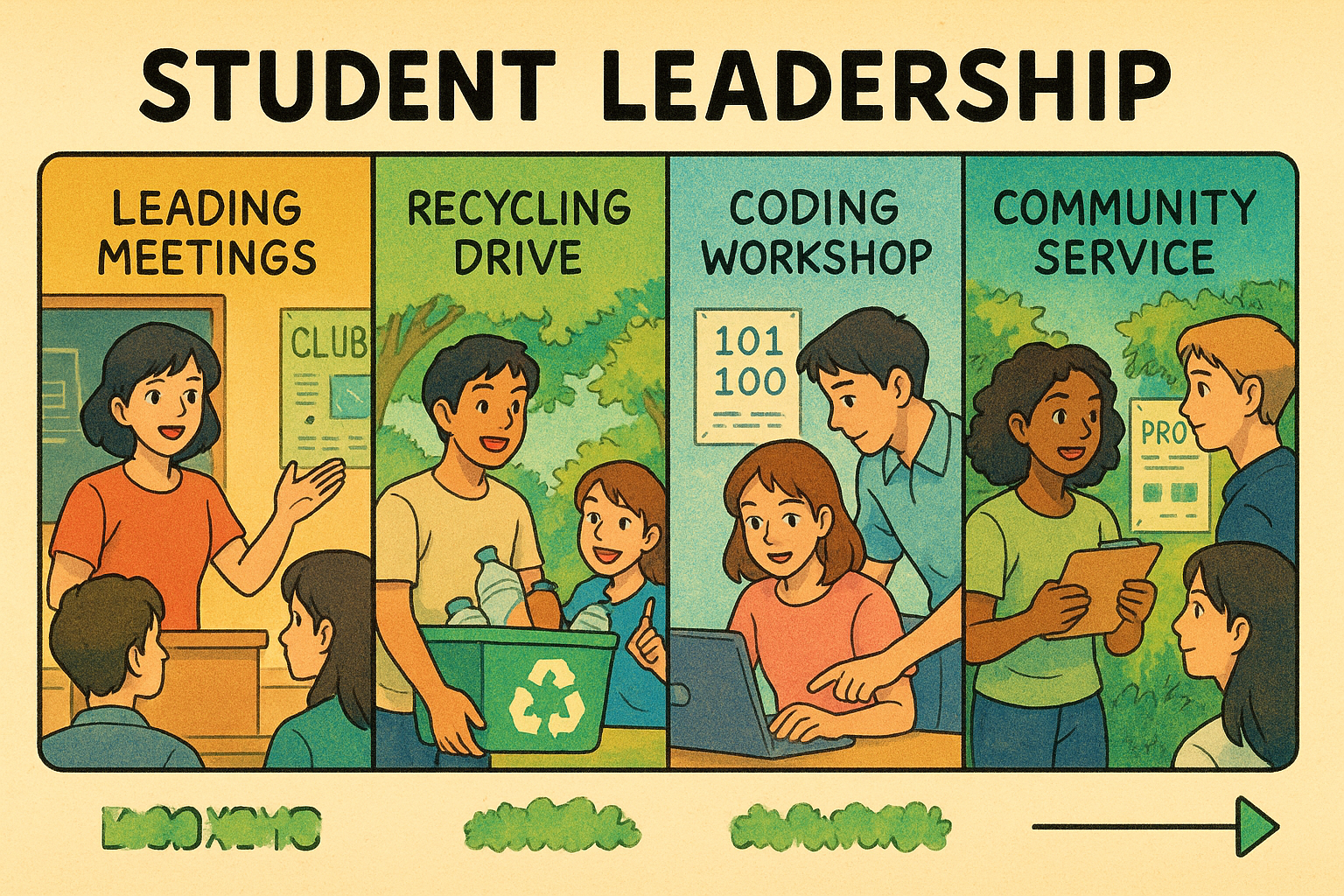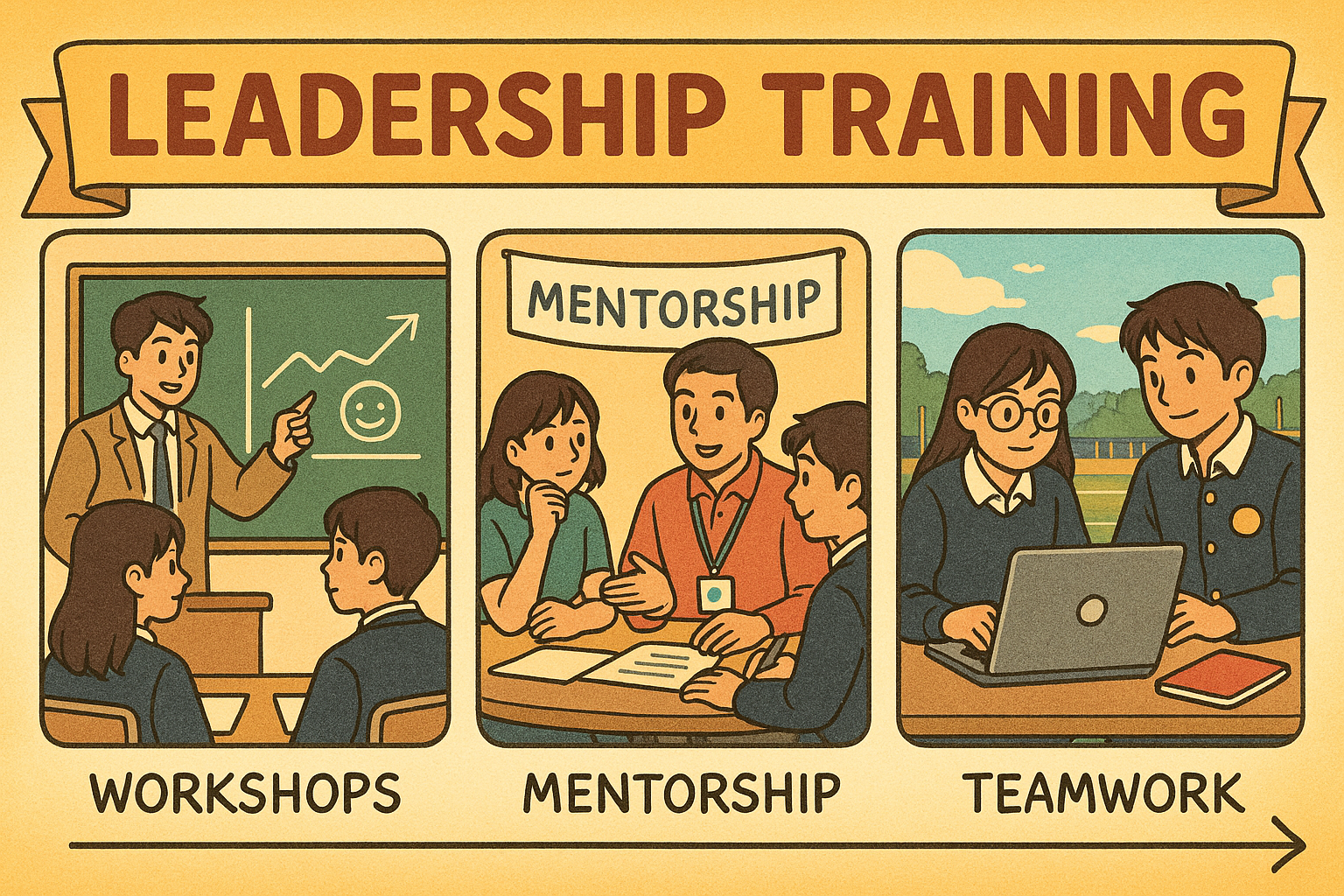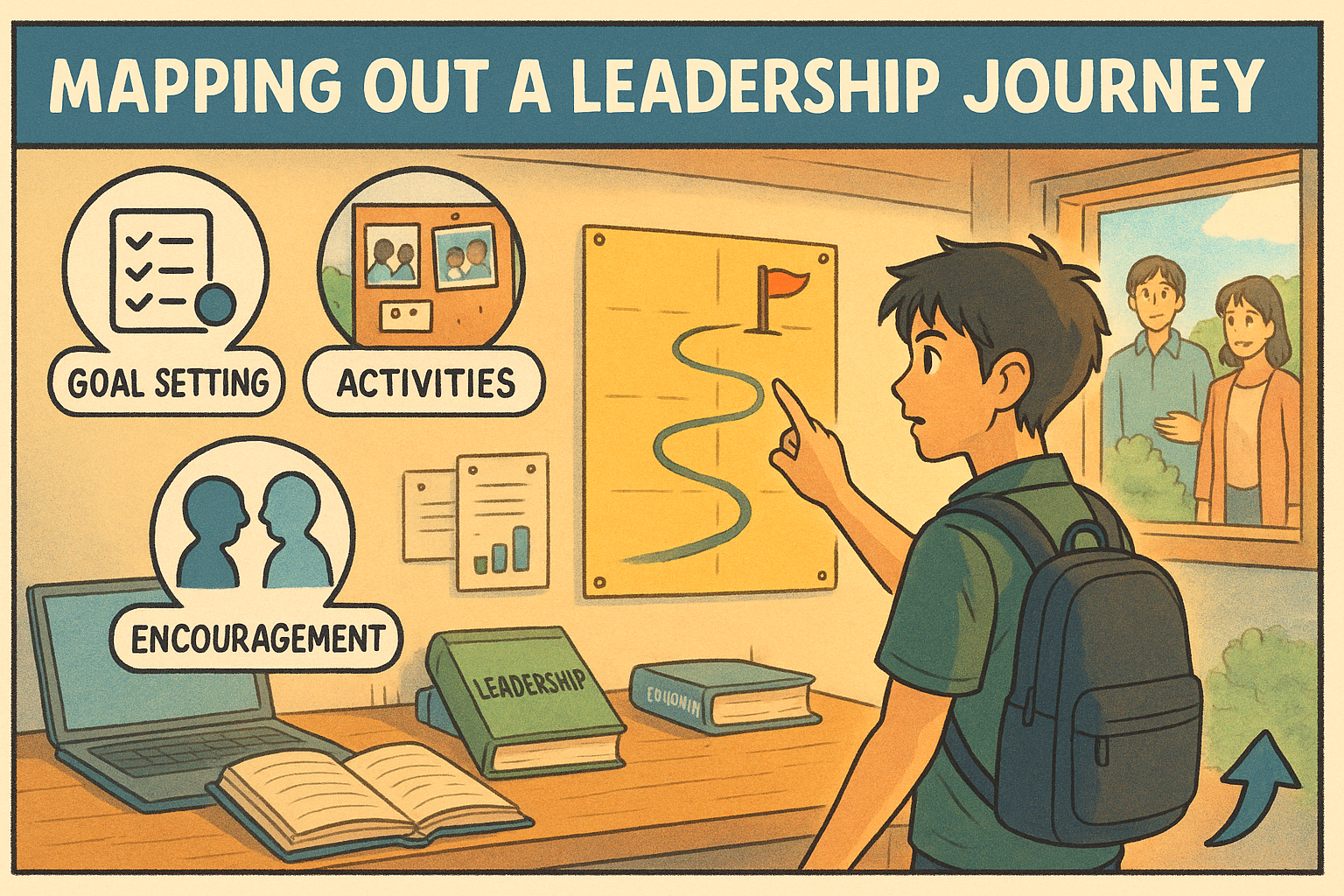Table of Contents
- Essential Qualities of a Good Leader
- Why Leadership Skills Matter for College Applications
- Strategies for Leadership Development as a High School Student
- Opportunities for Leadership Training and Experience
- Documenting Leadership on College Applications
- Getting Started Practical Tips and Next Steps
- Conclusion Leadership as an Ongoing Journey
Essential Qualities of a Good Leader
Understanding the core leadership qualities that colleges value is the first step toward developing them. These qualities aren't just impressive on applications—they're life skills that will serve you well throughout college and your career.
Communication is fundamental to effective leadership. Strong leaders express ideas clearly and listen actively to others. This might look like running productive club meetings, giving presentations, or helping resolve conflicts between team members. Being a good communicator also means adapting your message for different audiences and actually hearing feedback instead of just waiting for your turn to talk.
Responsibility shows up when you take ownership of tasks and outcomes, even when things get tough. Colleges want students who follow through on commitments and hold themselves accountable. This quality shows you're ready for the independence that college life demands.
Initiative is what sets true leaders apart. Proactive students identify opportunities for improvement and act without waiting to be told what to do. Maybe you started a new club to address an unmet need, proposed solutions to school issues, or volunteered for challenging tasks everyone else avoided. This signals to admissions officers that you'll actively contribute on campus.
Empathy might be the most underrated leadership quality. Understanding others' perspectives creates stronger teams and more inclusive environments. Empathetic leaders recognize diverse strengths, make space for different voices, and build genuine connections. According to MindTools, empathy in leadership leads to higher team engagement and more innovative problem-solving.
Problem-solving abilities show you can approach challenges with creativity and perseverance. This involves analyzing situations, considering multiple solutions, and implementing the most promising approaches. Great problem-solvers don't give up when obstacles arise—they adapt and find new paths forward.
Teamwork might seem contradictory to leadership, but the best leaders are also excellent collaborators. They recognize when to lead and when to support, delegate effectively, and acknowledge team members' contributions. Colleges want students who can both take charge and work cooperatively toward shared goals.
These leadership qualities form the foundation for effective leadership in any context. As you continue reading, you'll discover how to cultivate these qualities through various activities and experiences.
Why Leadership Skills Matter for College Applications
Leadership skills aren't just buzzwords in college admissions—they're essential criteria that can significantly impact your application's success. Let me break down why colleges place such high value on leadership potential.
First, leadership experiences are predictors of campus contribution. Colleges are searching for students who will actively participate in campus life, not just excel academically. Your leadership experience signals that you'll likely get involved, take initiative in student organizations, and help create a vibrant campus community. Harvard's admissions criteria explicitly state they look for "students who will be active citizens and contribute to the well-being of others."
Leadership experiences are also powerful indicators of character and maturity. According to The Princeton Review, leadership demonstrates responsibility, resilience, and the ability to work with others—qualities that translate to success in college environments where independence and self-direction are essential. Admissions officers know that students with leadership experience often transition more smoothly to college life.
Colleges want evidence of real-world impact. They want to see that you've made a difference in your communities. Leadership roles provide concrete evidence of your ability to effect change, whether through organizing events, advocating for causes, or implementing new initiatives. This demonstrates that you don't just participate—you transform.
In applicant pools filled with strong academic credentials, leadership experiences help you stand out. As one Stanford admissions officer noted, "Leadership doesn't require a title. We look for those who influence their communities positively, whether formally or informally." This perspective opens the door for recognizing many forms of leadership beyond traditional positions.
Finally, colleges are invested in their graduates' long-term success. Students who demonstrate leadership skills in high school are more likely to become leaders in their fields and communities after graduation, reflecting positively on the institution. This is why admissions committees look for evidence of leadership potential that can be developed further during college years.
The impact of leadership skills on admissions decisions is substantial. In a survey of college admissions officers, 96% reported that demonstrated leadership was a significant factor in their evaluation process, with many ranking it among the top three non-academic considerations.
Strategies for Leadership Development as a High School Student

Developing leadership skills doesn't happen overnight—it requires intentional effort and practice. Here are effective strategies for leadership development that high school students can implement:
Joining clubs and organizations provides structured opportunities to practice leadership. Start as a member to understand the organization, then pursue leadership positions like committee chair, secretary, or president. Even without an official title, you can demonstrate leadership by suggesting new initiatives or volunteering to coordinate events. For example, one student joined her school's environmental club as a freshman, proposed and led a campus-wide recycling program as a sophomore, and was elected club president by junior year.
Starting your own initiatives demonstrates exceptional initiative and vision—qualities colleges highly value. This could be founding a club addressing an unmet need, organizing a community event, or launching an awareness campaign for a cause you care about. I know a high school junior who noticed a lack of STEM opportunities for middle school girls and started a weekend coding workshop series, recruiting classmates as instructors and securing space at the local library.
Volunteer and community service opportunities often provide natural leadership development experiences. Rather than simply accumulating service hours, look for ways to take on increasing responsibility within organizations or coordinate service projects yourself. The National Honor Society emphasizes that "leadership through service" develops crucial skills while making a meaningful difference. Consider organizing a fundraiser, coordinating volunteers, or developing new programs for organizations you support.
Academic settings offer numerous leadership opportunities too. Lead study groups, initiate research projects, or create tutoring programs. These experiences demonstrate your ability to facilitate learning and support peers—valuable leadership qualities that translate directly to college environments.
Don't forget about non-traditional leadership roles. Leadership doesn't always come with a title. You can demonstrate leadership qualities by being a positive influence, standing up for others, or taking initiative in everyday situations. Colleges recognize that quiet leadership—mentoring younger students, mediating conflicts, or being the person who consistently steps up when needed—reflects authentic leadership character.
As you engage in these activities, document your growth by keeping detailed records of your responsibilities, challenges, and accomplishments. Note specific examples of how you've applied leadership skills and the impact of your actions. This documentation will prove invaluable when crafting your college applications.
The key to effective leadership development is consistency and progression. Start with smaller responsibilities and gradually take on more complex challenges. This natural evolution demonstrates your growing capacity for leadership and provides compelling evidence of your potential.
For more inspiration on what makes a well-rounded application, see our guide on the best extracurricular activities for Ivy League admissions and unique extracurricular activities that impress top universities.
Opportunities for Leadership Training and Experience

Formal leadership training programs can accelerate your leadership development by providing structured learning, mentorship, and practical experience. Let's explore some valuable opportunities to consider.
Established leadership programs offer specialized training for high school students. Hugh O'Brian Youth Leadership (HOBY) selects sophomores for intensive leadership seminars focused on personal, group, and societal leadership. HOBY alumni report significant growth in confidence and leadership abilities. The National Student Leadership Conference (NSLC) offers immersive summer programs across various fields, combining leadership training with career exploration at prestigious university campuses. Junior State of America (JSA) is a student-run organization focusing on developing leadership through civic engagement, debate, and governmental processes. Many communities also offer youth leadership programs through chambers of commerce, rotary clubs, or community foundations that typically combine leadership coaching with community service projects.
School-based leadership opportunities extend beyond traditional student government. Model United Nations and debate build critical thinking, public speaking, and negotiation skills—all essential leadership qualities. JROTC Programs provide military-oriented leadership training that emphasizes discipline, teamwork, and civic responsibility. Sports team captaincy develops motivation skills, conflict resolution, and performance under pressure. Peer mentoring programs that guide younger students build coaching and interpersonal leadership skills.
Online leadership resources offer flexible, accessible training. Harvard Online's "Leadership Essentials" provides university-level courses teaching fundamental leadership principles and communication strategies. EdX Leadership Courses offer free or low-cost courses from top universities covering various leadership styles and techniques. LinkedIn Learning features practical leadership modules focused on specific skills like conflict resolution, team motivation, and strategic thinking.
Leadership coaching provides personalized guidance to accelerate leadership growth. According to the International Coaching Federation, coaching helps identify strengths and overcome barriers to leadership development. You might find coaching through school counselors with leadership development expertise, community mentorship programs, college student mentors through alumni networks, or professional coaches (some offer reduced rates for students).
Self-initiated projects create your own leadership laboratory through independent projects that demonstrate exceptional initiative. These might include community problem-solving where you identify a local issue and organize efforts to address it, entrepreneurial ventures where you start a small business or social enterprise, or advocacy campaigns where you lead awareness or policy change initiatives for causes you care about.
When selecting leadership training opportunities, consider programs that align with your interests and provide concrete experiences you can reference in college applications. The most compelling leadership development combines formal training with practical application—learning principles, then implementing them in real-world settings.
Discover more about how entrepreneurial experiences and real success stories can set you apart in applications in our article Entrepreneur Stories That Inspire Success In College Applications. If you're interested in how students have overcome challenges, check out Success Stories Of Students Who Overcame Challenges To Achieve Their Dreams.
Documenting Leadership on College Applications
Developing leadership skills is only half the equation—you must also effectively communicate these experiences to admissions committees. Here's how to showcase your leadership qualities throughout your application:
Your essays offer prime opportunities to illustrate your leadership journey. Instead of simply stating "I am a leader," describe specific situations where you demonstrated leadership qualities. Detail the challenges you faced, actions you took, and results you achieved. Colleges value development over perfection, so share how your leadership abilities evolved through experiences, including setbacks that taught valuable lessons. Explain why you chose to lead in particular areas, revealing the principles and passions that drive your leadership. Discuss what you've learned about effective leadership and how these insights will shape your contributions to campus. According to College Essay Guy, the most compelling leadership essays focus on transformation—either personal growth or positive change created for others.
When describing extracurricular activities, emphasize leadership dimensions. Begin descriptions with powerful verbs like "Coordinated," "Initiated," "Transformed," or "Mobilized" to highlight leadership actions. Include specific numbers when possible—"Recruited 15 volunteers," "Increased participation by 30%," or "Raised $2,000 for community projects." Show advancement in responsibility over time, from member to committee chair to president, demonstrating growing leadership capacity. Even without official titles, describe how you influenced positive outcomes through initiative and collaboration.
Guide your recommenders to address your leadership qualities by providing them with specific examples of your leadership they may reference, sharing your leadership philosophy and goals, and requesting they address particular leadership qualities you've demonstrated.
For admissions interviews, prepare leadership stories that demonstrate different qualities: a time you led through challenging circumstances, an example of collaborative leadership, a situation where you took initiative without being asked, or a moment when your leadership made a meaningful difference.
Admissions officers consistently emphasize that authentic leadership matters more than impressive titles. As one Harvard admissions interviewer noted, "We're more interested in the difference a student made than the position they held. A founder of a small, impactful initiative often impresses us more than a figurehead president of an established club."
Remember that leadership documentation should form a coherent narrative across your application components, with each element reinforcing and expanding upon the others to create a compelling leadership profile.
For a deep dive on writing essays and crafting activity lists, see our detailed guides: How to Write a Successful College Essay That Stands Out and College Application Guide For Successful University Admissions. You can also review College Application Examples To Inspire Your Successful Submission for inspiration.
Getting Started Practical Tips and Next Steps

Ready to begin your leadership development journey? Here are concrete steps to identify your leadership style, set goals, and start building leadership skills today:
Start with self-assessment to understand your leadership starting point. Take a leadership style assessment like MindTools' Leadership Style Quiz to identify your natural leadership tendencies. Make a list of situations where you've already shown leadership qualities, even informally. Did you coordinate a group project? Help resolve conflicts among friends? These count! Ask teachers, coaches, or peers about leadership qualities they've observed in you and areas where you could develop. Identify your passions, because leadership feels more natural when connected to causes and activities you genuinely care about. What issues motivate you to take action?
Set achievable leadership development goals to create a roadmap for your leadership growth. Start small with an initial goal like "Lead one class discussion this month" or "Propose one new idea at the next club meeting." Plan a sequence of increasingly challenging leadership experiences over your high school years. Balance formal and informal leadership by aiming for both official positions and opportunities to demonstrate leadership qualities without titles. Create accountability by sharing your goals with a mentor who can check in on your progress and provide guidance.
Finding leadership mentors and coaches will accelerate your development. Approach teachers or counselors whose leadership style you admire, connect with older students who have leadership experience, explore formal mentorship programs through community organizations, or consider leadership coaching through school resources or community programs.
Take immediate action to begin building leadership skills with these accessible starting points. Join a group aligned with your interests where you can gradually take on more responsibility, volunteer for a one-time leadership role like coordinating a specific event or project, start a study group where you can practice facilitation skills, or identify a small problem in your school or community and propose a solution.
Track your leadership journey by documenting your experiences from the beginning. Keep a leadership journal noting challenges, successes, and lessons learned. Collect tangible results of your leadership like photos, testimonials, and metrics. Update your resume regularly with new leadership experiences and reflect after each experience on what worked well and what you'd do differently.
Remember that leadership development is a continuous process, not a destination. Each experience builds upon previous ones, creating a foundation of skills and insights that will serve you throughout college and beyond. The most important step is simply to begin. Choose one action from this section and commit to completing it this week. Your leadership journey starts with that first deliberate step.
For a full overview of the admissions process, including timelines and key milestones, see College Application Guide For Successful University Admissions and our comprehensive guide to Understanding the College Admissions Process Step by Step.
Conclusion Leadership as an Ongoing Journey
Developing leadership skills for college applications isn't about checking boxes or accumulating impressive titles—it's about authentic growth and meaningful impact. The most compelling leadership stories come from students who genuinely engage with their communities, take initiative where they see needs, and consistently work to develop their abilities to influence positive change.
Colleges value leadership because it indicates a student's potential to contribute to campus life and eventually to society. Admissions officers are skilled at distinguishing between resume-padding leadership positions and genuine leadership experiences that reflect a student's character and capabilities.
As you continue your leadership journey, remember these key principles: Focus on impact over titles, as the difference you make matters more than the positions you hold. Embrace leadership as a learning process, where every experience, including setbacks, contributes to your development. Seek opportunities aligned with your authentic interests, because leadership feels natural when connected to causes you genuinely care about. Balance skill development with practical application by combining learning about leadership with actually practicing it. Document your journey thoughtfully by reflecting on and recording your experiences to create a compelling narrative for your applications.
The leadership skills you develop now will serve you far beyond the college application process. They'll help you thrive during your college years, launch your career, and make meaningful contributions throughout your life. According to Forbes, authentic leadership—grounded in self-awareness, genuine passion, and a commitment to growth—creates lasting positive impact in any environment.
As you prepare your college applications, remember that admissions officers are looking for students who will bring their unique leadership qualities to campus. By thoughtfully developing and documenting your leadership journey, you'll not only strengthen your applications but also prepare yourself for success in college and beyond.
Your leadership story is uniquely yours. By taking intentional steps to develop your leadership skills and authentically sharing that journey in your applications, you'll present a compelling case for your admission to the colleges of your choice.
Frequently Asked Questions
What if I don't have any official leadership positions?
If you want examples of how students achieved success even without formal titles, take a look at Success Stories Of Students Who Overcame Challenges To Achieve Their Dreams.
How many leadership activities should I include on my application?
You can view real examples in our blog post College Application Examples To Inspire Your Successful Submission.
Can freshman and sophomore leadership experiences still count?
How do I balance leadership activities with academics?
What if my leadership attempt wasn't successful?
You might find inspiration from students who overcame challenges to achieve their dreams.

